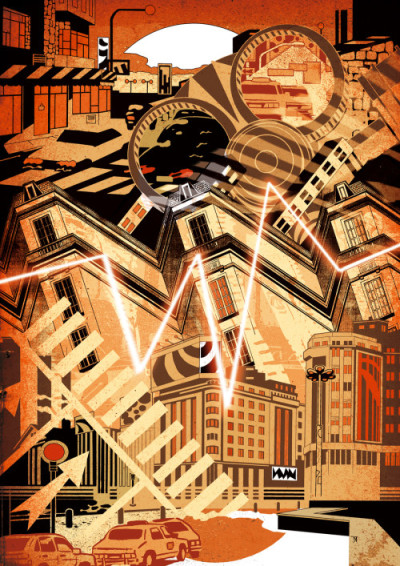She was suspicious that everyone in the room was melting. The man sitting at the coffee table directly in her line of sight was watching his hands indifferently as they liquefied in pools on the table and dripped to the floor. Everything else blurred into a peripheral side note that emanated an oppressive heat. The walls and floor rippled, making her seasick as she patted her sopping face.
Leaning over to support her cheekbones with her hands, ineffective props because her entire body was softening as the room temperature rose, she wondered if her lower body was fused to the chair. The heat intensified within her skull, and the swelter was unapologetically heavy-handed as it drilled its way up her nostrils and clawed into her eardrums.
At first her mind had raced steadily, but now it was producing evidence of its acceleration. Every secondary insecurity ricocheted off a primary one, and she felt physical pangs as the third and fourth misgiving budded off the second like aggressively reproducing yeast. She was manufacturing and processing spite at speeds previously unknown to mankind, and she felt it was probably killing her.
The last time she cried like this — feverishly, neurotically — was when she realized she was inherently, incorrigibly spiteful. That was the last time she had made an effort to believe she was truly happy for another person.
Her body kick-started ventilation to prevent the structure of her skullcap from being compromised completely by the heat festering behind her nose. She breathed in and out, in and out, out twice clumsily, then in again. This self-preservation was neither clearly a natural nor a conditioned impulse. She wondered if cave people had practiced controlled breathing; she wondered about primordial spite.
Inspecting her face a second time, it seemed the heat had subsided, and her cheeks were still wet to the touch but the wetness was removable. She sensed the room shift from tense to relieved and realized that as she had watched her surroundings distort behind her circus-mirror tears, her surroundings had witnessed the entire episode. From her initial gasp to her final post-weeping hiccup, and every kicked-in-the-stomach whimper in between, she had accidentally performed quite the tragedy for a multitude of complete strangers.
The man sitting at the table to her right was perhaps the only proximate living thing who did not notice her. Instead he was communicating with someone, possibly multiple someones, by speaking into his cellphone. He was holding the phone so that he and his device were facing each other, and he was yelling directly into its face about like geoeconomic stock and a few other severely financial matters. His unoccupied meaty hand was making a show of itself, signaling to the phone call participants, none of whom were able to see the man or his dramatic meat claw, the entire gradient of emotions between annoyance and anger.
To her he seemed like the type of guy who had small numbers for things where big numbers were generally desired and vice versa. She was right.
McPherson, the man’s name as indicated by the name label sticker that was collecting dirt on edge of his corporate day planner, was thinking about that as well. While berating his staff, he thought about the men on the receiving end of his criticism who wore nicer ties than he did despite having smaller paychecks. McPherson then considered how many of his subordinates had larger penis than he did, and he chalked this number up to quite a few.
He had scanned the U.S. census a few weeks prior to discover that his waist measurement was unfortunately larger than most while his penis length and girth were both unfortunately smaller. He had also been called a small person before by someone who disliked him. People say someone is a ‘small person’ when their capacity to appear selfless is less than the national average. Like his penis, the radius of McPherson’s sympathizing brain remained below average even when stimulated.
His briefcase, which was leaning against the leg of his chair, had MCPHERSON, INC. embossed in the leather multiple times. He chewed a gum that smelled like chemicals and she suspected that he chewed it because he liked the idea that those chemicals would either make him average or kill him altogether.
She stood up now and went outdoors. As she walked down the street she saw a waxy poster on the window of a gym that advertised their newest workout involving like something to do with wading in baths of dirt it seemed. It boasted that it was the “all natural” alternative to the gym’s previous water aerobics class.
The poster challenged, “COME SHOW US WHAT YOU’RE MADE OF.” She spit on the concrete and thought, Acid, probably.
___
The featured image accompanying this piece, entitled ‘City’, has been used with the permission of artist, Diego Tripodi.
Diego Tripodi was born in 1983 in Buenos Aires, Argentina, where he lives and works.
His work can be seen at diegotripodi.com.







